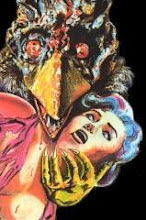Daniel Craig on Enya and Torture: Hands down one of my favorite moments from the David Fincher remake of The Girl With the Dragon Tattoo was the use of Enya's "Orinoco Flow" in the background as Daniel Craig's Mikael Blomkvist is being tortured by the film's killer. It was such an excellent, unexpected juxtaposition. Curious as to what others thought of this scene I did a quick search online to find more information. As a result I found this short article that explains how the vintage Enya track was selected to accompany the crucial scene. I'm not going to summarize the article here as you can read it for yourself in like five seconds, and you should as it's a rather entertaining tidbit on one of my favorite movie moments of the last year. Now can somebody get Enya herself to comment on the scene, 'cause I'd love to read that.
On a related note, check out this New York Times article from the mid-1990's which chronicles the trend in film of juxtaposing scenes of brutality with innocuous pop tunes. This article is made all the more interesting by the fact that it was written well over a decade before The Girl With the Dragon Tattoo. It's thus a testament to the film that the Enya torture scene felt as fresh and effective as it did. Or maybe I'm just a sucker for these types of juxtapositions.
The Grey trailer: Okay, I realize that a dude vs. wolves movie would normally sound pretty idiotic, but you stick Liam Neeson in the lead and suddenly it seems worthy of a watch. I'm not saying it'll be a cinematic masterpiece, but I personally can't wait to see Liam Neeson continue to develop his badass action persona of Taken fame. Humorously, there was at one point even Oscar buzz for Neeson's role in The Grey. Check out this article about the film's release date which writes, "...most of the buyers who previewed some 30 minutes of footage from The Grey are describing Neeson's lead turn as pure 'Oscar bait'". Personally I couldn't care less about acting chops. I just want to see some wolves get their asses kicked in the most outrageous way possible.
Retro Polish and Czech posters for kaiju movies: As the title says, here's a collection of posters for Japanese monsters movies from Poland and Czechoslovakia. The posters date back from the late 1950's to the early 1980's and they are obscenely cool. The Polish Godzilla vs. Hedorah poster from 1971 is particularly awesome with Hedorah's eyes and body pattern in the shape of Godzilla's distinctive silhouette. It's very cool and iconic looking.
On a related note, check out this New York Times article from the mid-1990's which chronicles the trend in film of juxtaposing scenes of brutality with innocuous pop tunes. This article is made all the more interesting by the fact that it was written well over a decade before The Girl With the Dragon Tattoo. It's thus a testament to the film that the Enya torture scene felt as fresh and effective as it did. Or maybe I'm just a sucker for these types of juxtapositions.
The Grey trailer: Okay, I realize that a dude vs. wolves movie would normally sound pretty idiotic, but you stick Liam Neeson in the lead and suddenly it seems worthy of a watch. I'm not saying it'll be a cinematic masterpiece, but I personally can't wait to see Liam Neeson continue to develop his badass action persona of Taken fame. Humorously, there was at one point even Oscar buzz for Neeson's role in The Grey. Check out this article about the film's release date which writes, "...most of the buyers who previewed some 30 minutes of footage from The Grey are describing Neeson's lead turn as pure 'Oscar bait'". Personally I couldn't care less about acting chops. I just want to see some wolves get their asses kicked in the most outrageous way possible.
Retro Polish and Czech posters for kaiju movies: As the title says, here's a collection of posters for Japanese monsters movies from Poland and Czechoslovakia. The posters date back from the late 1950's to the early 1980's and they are obscenely cool. The Polish Godzilla vs. Hedorah poster from 1971 is particularly awesome with Hedorah's eyes and body pattern in the shape of Godzilla's distinctive silhouette. It's very cool and iconic looking.








